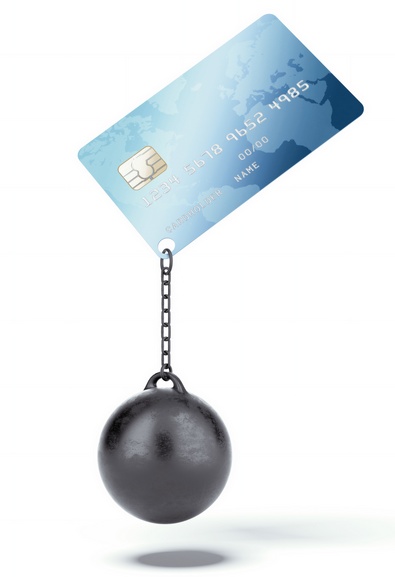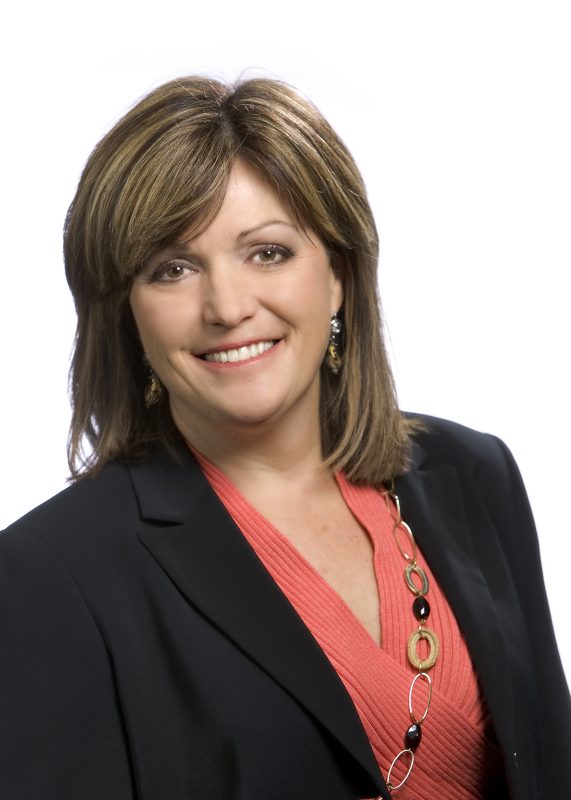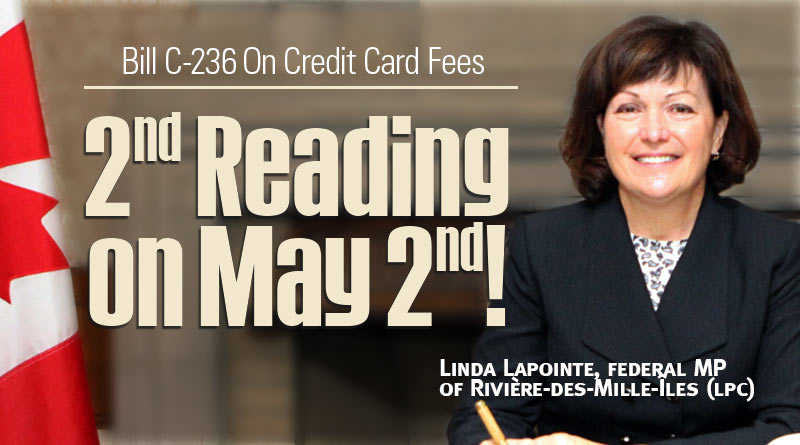EXCLUSIVE: Second Reading Of Bill C-236 On Credit Card Fees Officially Scheduled For May 2nd
The long-awaited hope of seeing credit card transaction fees capped at 0.5% through regulation in Canada, as in Europe for the past several years, has come to a possible turning point.
Indeed, DepQuébec learned that the Trudeau government has scheduled Private Member’s Bill C-236 on credit card fees to be given a Second Reading on Wednesday, May 2, exactly one month from now.
If the First Reading, which dates from two years ago (February 2016), was mainly about introducing the bill, it is at the Second Reading stage that things become real. Members of Parliament must debate the bill’s principle and, if it passes, it is almost always referred to a committee for more detailed study. The latter could then decide to hold hearings and invite stakeholders before reporting back to Parliament.
In other words, next month the bill will either succeed or die!
Moment of truth for retailers
Thus, it was two years ago that Linda Lapointe, a new Liberal MP from Rivière-des-Milles-Îles, had introduced her Private Member’s Bill in the wake of a parliamentary lottery she had won by sheer luck and which gave her this privilege.
And it was with great political skill that the MP — and former grocery store owner — introduced a bill with such major and huge repercussions for Canadian retailers.
Credit card fees represent billions of dollars in mandatory annual expenditures for retailers, restaurant owners, hotel managers and others. A regulatory cap on rates at 0.5% would result in considerable savings for the whole retail industry that DepQuébec estimates at about $4 billion a year, the average fee being 1.5% at the moment, according to card companies. Such a windfall would come at just the right moment, when provincial governments are currently competing between each others to increase the minimum wage across Canada.

This huge booty is currently eaten up by the bottomless greed of credit card companies without generating any real economic added value. Their current business practices have already been deemed “anti-competitive” by the Competition Bureau of Canada.
While most agree that Canada’s credit card transaction fees are among the highest in the world, the fact remains that the Federal government has often reiterated that there is no legal basis or mechanism for capping them, even if it wanted to.
Hence the relevance of Bill C-236, which, in one paragraph, grants the Minister of Finance the power to cap such fees. A clever approach since the passage of the Bill does not require a debate on credit card rates, but simply on the principle that the Minister can act on them!
A little boat hauling the liner
By introducing her Private Member’s Bill so early into the first mandate of Justin Trudeau, Linda Lapointe was like a little boat trying to haul a liner. Back in power after spending 10 years in the opposition, the Trudeau government has lots of priorities on its agenda, among which credit card fees were not very high on the list. Without being against the idea, especially after the efforts of Senator Pierrette Ringuette who made the issue of capping fees her personal crusade, this was never truly part of the Prime Minister’s economic plan or vision, and the same can be said for his Minister of Finance, Bill Morneau.
“I am positive”
This is an extraordinary challenge that the neophyte Federal MP had therefore chosen to tackle when, in early 2016, she introduced her own Private Member’s Bill.
In an exclusive interview with DepQuébec, Linda Lapointe seemed on her guard not to appear triumphant or even to say anything that would precede her government’s intentions and announcements.
Her optimism, however, was palpable and she made no effort to hide it.
DepQuébec: Ms. Lapointe, here is a direct question: Is the fact that your bill will be shortly given a Second Reading a sign that you have the full support of the government and the Prime Minister to cap credit card fees?
LL: As you know, Finance Minister Bill Morneau announced in 2016 an assessment of the credit card ecosystem. This study is not yet complete. In the meantime, I remain positive about the evolution of this issue in general. The fact that the Bill will be given a Second Reading is certainly an equally positive sign.
DepQuébec: Have you felt a lot of support for your initiative among Canadian retailers?
LL: Yes, a lot. Not only retailers in general, but also restaurant owners. And I have seen among my colleagues, both inside and outside the cabinet, attitudes and perceptions evolve on this issue for the past two years.
DepQuébec: The Visa and MasterCard duopoly has signed a five-year voluntary agreement with the previous government to reduce the average credit card fees to 1.5%. That agreement ends in 2019. Do you have any indication of what the government intends to do about it?
LL: As I told you, I remain positive and optimistic about the evolution of this issue. It has a huge impact on the middle class, and as you know, the middle class is at the heart of our government’s political action.
DepQuébec: Do you have any trouble getting your colleagues interested in this matter since interchange fees are hidden from public’s view and had it not been for your experience as a grocery owner, you probably wouldn’t know about them either?
LL: One of the things that was very impactful was when Walmart decided, at some point, to no longer accept the VISA card in Canada. This decision by such an important retailer has raised the awareness of many MPs.
DepQuébec: Ms. Lapointe, a big thank you and please be assured that you have the full support of all convenience stores across the country.
LL: Thank you!
Does a Private Member’s Bill Has Real Chances of Becoming Law?
In our parliamentary system, bills that do not emanate from members of cabinet ministers are called “private”. A private member’s bill follows the same legislative process as a government bill, but the time allocated for its consideration is restricted. Most private bills do not become law, but some may succeed.
In the case of C-236, however, there are several elements that give us hope that it could have a winning outcome:
- it comes from a Liberal MP and they, under Justin Trudeau, have more room to voice their concern and contribute to the agenda;
- when it was tabled in 2016, it was followed by a two-year hiatus allowing the Minister of Finance to make an exhaustive assessment on the subject, thus studying all ramifications at his own pace;
- the opposition parties overwhelmingly support Bill C-236 and even kept urging the government knowing that the bill originates from one of their own MPs;
- the bill itself is very clever because it is limited to giving additional legislative power to the Finance minister, not to setting a ceiling on fees himself. If adopted, it does not mean that credit card rates will be capped tomorrow, but makes it highly plausible.
According to Michel Gadbois, President of the Quebec Convenience Stores Association (QCSA) and former employer of Linda Lapointe, this Second Reading stage is unquestionably a unique opportunity to cap credit card rates once and for all.
“All players in the retail industry should rally behind this initiative. Since Europe capped rates a few years ago, Canadian retailers have lost tens of billions of dollars in credit card fees, or probably as much if not more than all of their profits… that’s enough! ” – Michel Gadbois, QCSA President
A month of pure and total mobilization to save $ 4 billion a year for life, is it too much to ask the retail industry? We do not think so.







